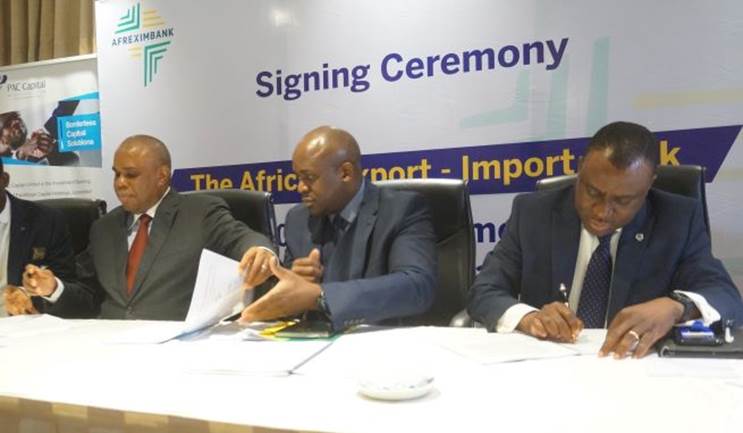
Lagos, Nigeria, 27 Jan. 2020: – The African Export-Import Bank (Afreximbank) today in Lagos, Nigeria, signed documents to complete the registration of a 300-billion Naira medium-term note with the Securities and Exchange Commission under the Bank’s local currency programme in what will be the Bank’s first-ever Afreximbank local currency fund raising programme in Nigeria.
President Prof. Benedict Oramah, who described the ceremony as historic, told guests at the signing that the Naira debt capital market activity which the programme would unlock would open the door to a new value-added relationship between Afreximbank and Nigeria.
He explained that, over the last few years, many of the Bank’s key clients had made requests for local currency funding, saying that that Afreximbank designed and launched a local currency programme in 2016 with the primary aim of providing financing to African entities in major domestic and regional supply chains, particularly those that did not generate hard currency receivables.
“In addition, we believed that using the debt capital markets in our member countries to raise the funding would contribute to the development of capital markets in those countries,” explained the President.
He described the timing of the note as opportune as Africa geared for commencement of trading under the African Continental Free Trade Agreements (AfCFTA), noting that there would be need to create productive capacities at national and regional levels and some businesses would require retooling. Others would need to expand key production units and secure reliable sources of local raw materials.
“Adequate and competitive local currency funding, through a pre-export financing arrangement will help these entities to create the necessary capacities to produce the goods required for export markets,” Prof. Oramah said. “The Bank’s local currency funding programme is part of the broad set of programmes designed to ensure Africa’s preparedness for the commencement of the AfCFTA. More importantly, it is part of Afreximbank’s objective of expanding the use of local currencies in the conduct of intra-African trade, as, together with the Bank’s Pan-African Payment and Settlement System, it will ensure that all foreign currency risks that have inhibited intra-regional trade are minimized considerably.”
Also speaking, Dr. Demola Sogunle, Chief Executive, Stanbic IBTC Bank PLC, said that the Afreximbank initiative was another noteworthy example of global best practice in treasury management and innovation to stay abreast of evolving market conditions.
“The establishment of the bond programme will aid in stimulating the expansion and development of Nigeria through Afreximbank’s intervention in various sectors of the Nigerian economy,” said Dr. Sogunle.
Expressing Stanbic IBTC Capital’s commitment to developing the Nigerian capital markets and driving financial innovation by advising clients on staying ahead of changing times, he said that the bank was pleased to assist Afreximbank in shaping its funding strategy.
Following approval of the Local Currency Funding Programme by the Afreximbank Board of Directors in response to rising demand for financing facilities denominated in local currencies from the West Africa Economic and Monetary Union, Rand area countries, Nigeria, East Africa and some parts of North Africa, the Bank, in 2017, began the process of registering the first note programme in the Nigerian Naira. Under the Nigeria Naira Note Programme, dubbed “Project Ramesses”, Afreximbank, acting as an “Issuer” of notes, seeks to establish a 300,000,000,000-Naira Medium-Term Note Issuance Programme and the issuance and offering of subsequent notes, subject to approved pipeline of Naira facilities.
Afreximbank appointed Stanbic IBTC Capital Limited as Lead Issuing House/Bookrunner and Chapel Hill Advisory Partners Limited, Lead Capital PLC, PAC Capital Limited and Vetiva Capital Management Limited as joint Issuing Houses/Bookrunners. The Bank also appointed Stanbic IBTC Trustees to be responsible for acting on behalf of the bondholders who hold legal title to the bonds and Africa Prudential Registrars as registrar to keep the register of the bonds once issued.
Afreximbank plans to roll out similar programmes in the Francophone West Africa, Southern Africa and Eastern Africa capital markets as demand for local currency funding from those markets materialise.







